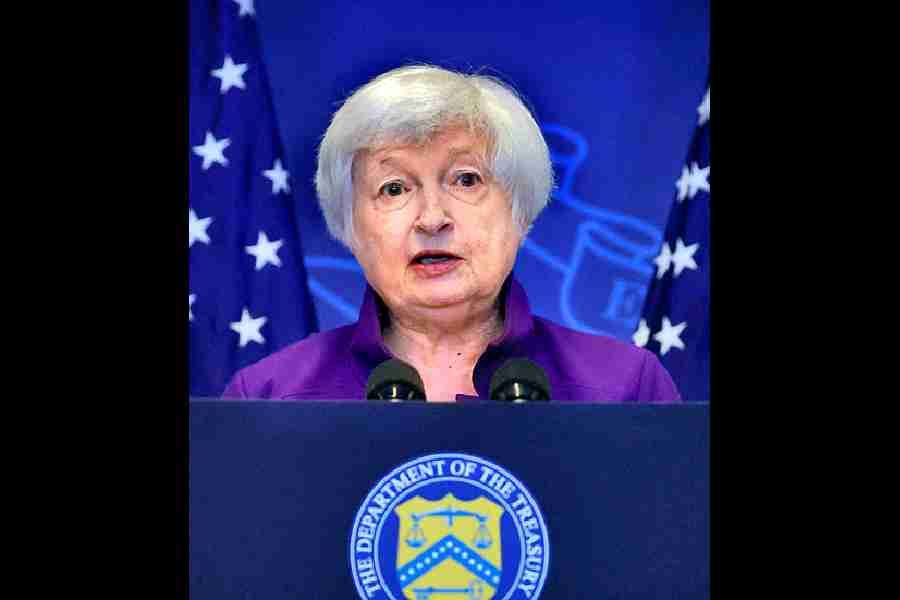Treasury secretary Janet L. Yellen came to China amid hopes that the US could restart a relationship that has been deteriorating for years and had gotten off the rails recently over significant points of tension — including the war in Ukraine, a Chinese spy balloon that flew over US territory and was shot down by the American military, and the two countries’ escalating exchange of restrictions on trade.
After 10 hours of meetings over two days in Beijing, Yellen said at a news conference on Sunday that she believed the US and China were on a steadier footing despite their “significant disagreements.”
“We believe that the world is big enough for both of our countries to thrive,” Yellen said.
Yellen announced that the two sides would pursue more frequent communication at the highest levels, describing improved dialogue as a way to prevent mistrust from building and fraying a relationship that she called “one of the most consequential of our time.”
Yet a meaningful easing of the economic tension may not be likely. Yellen headed back to Washington on Sunday with no announcements of breakthroughs or agreements to mend the persistent fissures between the two nations. And Yellen made clear that the Biden administration has serious concerns about many of China’s commercial practices, including its treatment of foreign companies, and policies that the US views as efforts at economic coercion.
On her trip, the first by a US treasury secretary in four years, Yellen met with four of the most powerful Chinese leaders involved in economic policymaking under President Xi Jinping, who is at the start of his third term in office: Premier Li Qiang, China’s No. 2 official; Yellen’s counterpart, Vice-Premier He Lifeng; the finance minister, Liu Kun; and the newly installed party chief of the People’s Bank of China, Pan Gongsheng.
Hours before Yellen’s news conference, China’s official news agency Xinhua issued a report on her visit that described the talks as constructive but also reiterated what China sees as key areas of dispute. The report expressed China’s continued objections to the Biden administration’s emphasis on preserving US national security through trade restrictions.
The US-China relationship is enormously consequential. Their economies, the world’s two largest, together represent 40 per cent of global output and remain integral partners in many ways.
Chinese officials raised their own concerns with Yellen. The treasury secretary said they discussed the tariffs that the Trump administration imposed on Chinese imports, which have been left in place. While Yellen has criticised tariffs as ineffective, she suggested that the administration would not make any decision about the levies until an ongoing internal review of them was concluded, reiterating the position of the administration since President Joe Biden took office.
She also acknowledged Chinese concerns about looming US restrictions on investment in China and said that she tried to explain that such measures would be narrowly targeted at certain sectors and would not be intended to have broad effects on China’s economy.
Chinese officials and experts also worry that the administration’s efforts to limit China’s access to certain technology could impair their development of high-potential industries like artificial intelligence and quantum computing.
“I explained that President Biden is examining potential controls on outbound investment in certain very narrow high technology areas,” Yellen said Sunday on CBS’s “Face the Nation,” adding that such restrictions “should not be something that will have a significant impact on the investment climate between our two countries.”
China has had its own broader restrictions on outbound investment since 2015, as it has encouraged Chinese companies and households to steer clear of overseas real estate speculation and has pushed them instead to invest abroad in sectors of strategic value like aircraft production, heavy manufacturing and cybersecurity.
Wu Xinbo, the dean of international studies at Fudan University in Shanghai, cautioned that Yellen’s trip would not result in a substantiveimprovement in relations unless it was accompanied by changes in the Biden administration’s policies toward China.
“So far, we haven’t seen any sign that Biden will rethink his economic policy toward China,” he said.
The desire for more dialogue struck some analysts as a significant development, with both countries at least talking about their disagreements after months of silence.
He Weiwen, a former official at China’s ministry of commerce who is now a senior fellow at the Centre for China and Globalisation in Beijing, welcomed Yellen’s comment that both China and the United States could thrive. “China and the US have profound differences, so constant, direct exchanges are not only constructive but of crucial importance,” he said.
Chinese economic policymakers have a long history of working more closely with the treasury department, which has historically valued China as a sizable investor in American bonds and as a potential market for American financial services.
New York Times News Service











